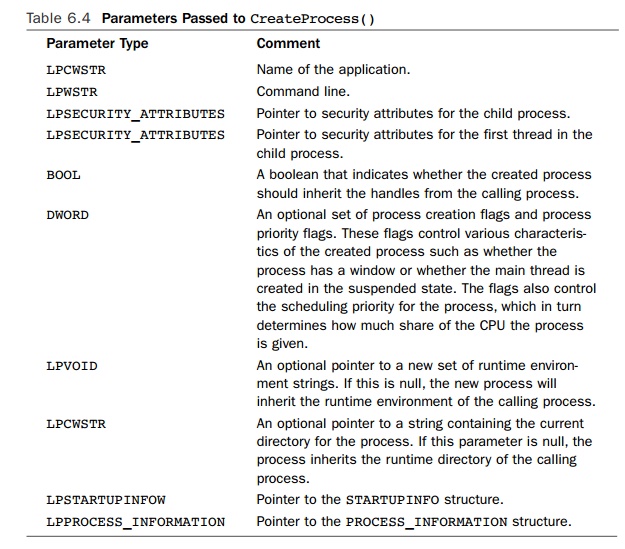Chapter: Multicore Application Programming For Windows, Linux, and Oracle Solaris : Windows Threading
Creating Processes
Creating
Processes
To create a new process, the first process calls CreateProcess(), which takes a number of parameters. The three critical parameters are
the name (and any parameters) of the process to be run, together with a pointer
to a STARTUPINFO
structure and a PROCESS_ INFORMATION
structure. Table 6.4 shows the full parameters to
this function.
Table 6.4 Parameters
Passed to CreateProcess()

The first parameter is the application name, and
the second parameter is the com-mand line. These two parameters work together.
If either is null, the other is used as the entire command line. Otherwise, the
application named by the first argument is executed but passed the command line
given by the second argument. This means that the first parameter of the
command line should be a repeat of the name of the application.
There are two further considerations: The Unicode
version of this function, CreateProcessW(), is
called, and the command line can be modified; hence, it should
always be stored in a variable rather than a
constant string. Second, if the application name is null, then the application
executed will be the first whitespace-delimited text in the command line. If
the path to the application contains a space, then the entire path and name
should be enclosed in quotes.
The third and fourth parameters are optional
pointers to SECURITY_ATTRIBUTES. The
first gives the attributes for the created process, and the second of these is
attributes for the first thread of the created process. These attributes
principally determine whether child processes of the created process will
inherit any handles owned by the created process. A null value for these pointers
provides the created process with the default attributes.
Both the STARTUPINFO and PROCESS_INFORMATION
structures should be zero-filled before the call. The cb member of the STARTUPINFO
structure needs to be set to the size of the structure. The call to CreateProcess() will record information in these struc-tures. The most important
information will be the handle of the new process that is recorded in the hProcess member of the PROCESS_INFORMATION
structure.
Listing 6.25 shows the steps necessary to create a
new process. If the application is started with a command-line parameter, the
process will print this out and then create a child process without any
parameters. If the process is started without any parameters, it prints out a
message indicating this and exits.
Listing 6.25 Starting
a New Process
#include
<Windows.h>
int
_tmain( int argc, _TCHAR* argv[] )
{
STARTUPINFO startup_info;
PROCESS_INFORMATION process_info;
if ( argc>1 )
{
wprintf( L"Argument %s\n", argv[1] );
wprintf( L"Starting child process\n" );
ZeroMemory( &process_info, sizeof(process_info)
); ZeroMemory( &startup_info, sizeof(startup_info) ); startup_info.cb =
sizeof(startup_info);
if (CreateProcess( argv[0], 0, 0,
0, 0, 0, 0, 0,
&startup_info,
&process_info )==0 )
{
printf( "ERROR %i\n", GetLastError() );
}
WaitForSingleObject( process_info.hProcess, INFINITE );
}
else
{
printf( "No arguments\n" );
}
getchar();
}
The handle of the created process is returned in process_info.hProcess. This handle is used in the call to WaitForSingleObject(). This call returns when the child process exits.
The call to getchar() at the
end of the code is there to wait for the Enter key to be pressed before the
process exits.
To pass arguments to a child process, it is necessary
to repeat the application name as the first command-line parameter. The entire
command line gets passed to the child process. Listing 6.26 shows the situation
where the child process is started with a single additional argument.
Listing 6.26 Passing
Arguments to a New Process
#include <Windows.h>
int _tmain( int argc, _TCHAR* argv[] )
{
STARTUPINFO startup_info;
PROCESS_INFORMATION process_info;
if ( argc==1 )
{
printf( "No arguments given starting child process\n" );
wchar_t
argument[256];
wsprintf(
argument, L"\"%s\" Hello", argv[0] );
ZeroMemory( &process_info, sizeof(process_info)
); ZeroMemory( &startup_info, sizeof(startup_info) ); startup_info.cb =
sizeof(startup_info);
if (CreateProcess( argv[0], argument, 0, 0, 0, 0, 0, 0,
&startup_info, &process_info )==0 )
{
printf( "ERROR %i\n", GetLastError() );
}
WaitForSingleObject( process_info.hProcess, INFINITE );
}
else
{
wprintf( L"Argument %s\n", argv[1] );
}
getchar();
Related Topics